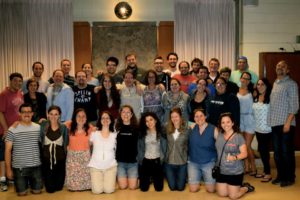“Ani student, v’ani lomed lihiot rav Reformi…..I am a student and I am studying to be a Reform rabbi.” So far, most taxi drivers have taken this as an invitation to quiz me on my religious practices, or to opine about the proper role of women in religious life.
“Do you keep kosher?”
Answer: “Maybe not the same way you do.”
“Do you fast on Yom Kippur?”
“Yes.”
“I don’t agree with women wearing kippot, or tefillin. Why do you Reformi have this?”
“Because we believe that women and men should have the same opportunity to choose how they wish to pray.”
Because this is Israel, these brief conversations can become quite spirited. More often than not, the driver seems confused, shrugs his shoulders, and drops me off. And more often than not, I feel a slow burn about not being seen as legitimately Jewish in the Land of Israel.
I shared my frustration at the religious/secular construct in Israel, and how I felt invisible as a liberal Jew who considers himself religious, but who is not Orthodox in daily life.
In Israel, the word “religious” has a particular connotation that can be confusing to an American. Here, religious people wear kippot if they are men and dress modestly if they are women. The haredi, the ultra-Orthodox, dress in prescribed styles that are particular to their communities. Religious people don’t ride in cars or eat in restaurants on Shabbat. Men who don’t wear kippot and women who wear clothing that exposes knees or elbows are assumed to be secular, or chiloni. No one asks you what you believe, or how you feel about God, or what prayer means to you, because this is irrelevant information in determining religiosity.
Last week I was dining at the Shabbat dinner table of a visiting American rabbi, who is a friend of one of my classmates. After the blessings and the meal and benching, the conversation turned to religion. One of the guests, an Israeli woman, described her conversation with a “religious” co-worker.
“I told her that I am secular, but she wouldn’t accept that. She asked me, ‘Do you keep kosher?’ And I said, ‘of course.’ She asked, ‘Do you fast on Yom Kippur?’ and I responded, ‘Of course.’ I just don’t dress modestly and I am very liberal with my Shabbat observance.”
I was surprised and I said to my fellow guest, “In America you’d be Reform!” She smiled at me with understanding. “Nachon [right], but here that isn’t part of the picture.”
I shared my frustration at the religious/secular construct in Israel, and how I felt invisible as a liberal Jew who considers himself religious, but who is not Orthodox in daily life.
Our host chimed in, “What you need to remember is that in Israel it’s about practice, not about what you believe. In America, the culture emphasizes personal belief. Here, it’s all about what you do.”
I was beginning to get it. In my own view of the world, I’m a very religious guy. I believe in God. I accept the great task of repairing the world that has been taken on by (or given to, depending on your point of view) the Jewish people. Prayer is an important part of my life. And, because I am studying to be a rabbi, I “do Jewish” every day.
In Israel, religious life has taken a different turn. All religious matters are decided by a state rabbinate that doesn’t recognize the legitimacy of Liberal Judaism (Reform, Conservative, Reconstructionist). Yet, there is a small but growing Reform movement in Israel. And virtually every American rabbinical student from the liberal streams comes to Israel to study so that we can understand the history and current reality of Israel and Israelis. We’re here, but we’re barely visible to the average Israeli.
Today Gilad Meiri, a notable Israeli poet, came to speak with my class about poetry. We read a number of poems, including Psalms and the work of other contemporary Israeli poets. He also read and discussed some of his own work. One if his poems spoke loudly to me about my discomfort with being seen as a Liberal Jew in Israel.
Sabbath Walk in Katamon
Gilad Meiri
Translation: Ohad Stadler
Sabbath Evening, I walk in the streets
In T-shirt and shorts,
relaxing the body, I step between prayers
that rise up to heaven, so light
circumcised intentions, without the foreskin of words.
My New-Balance shock absorbers
absorb, like in an oil press,
potholes of broken olive pits
that fell to the asphalt
blackening the sidewalk with nectar,
the municipality doesn’t hold harvests.
Massaging organs and internal
sides I breathe and pluck to the lungs
gleanings of prayers
left hanging
from the branches of silence
of Sabbath Evening.
(The italics are mine.)
In this poem, the poet strolls through Katamon, a religious neighborhood of Jerusalem. He does not dress or otherwise identify as religious in any way. Yet, as he hears the Shabbat prayers being said by religious people, and he takes them in as a gleaning…..a biblical reference to mitzvah of leaving a small portion of crops for those who do not have enough to eat.
He is not religious, but he benefits from the prayers of the religious. This poem opened in me an appreciation of the complexity of religious identity and observance in Israel. And it makes me wonder what gleanings of Liberal Judaism I can leave from my prayers for anyone to share.
This is the third in a series of posts about life in Jerusalem through the eyes, ears and experiences of a first-year rabbinical student. The second post can be found here.


